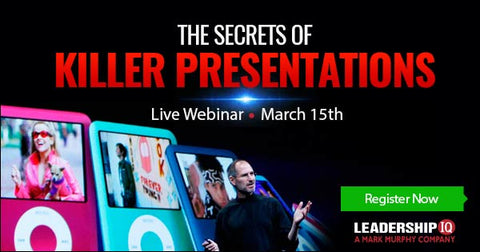Video: Develop Communication Skills Using Concrete Language
VIDEO TRANSCRIPT: Develop Communication Skills Using Concrete Language
When we talk about developing great communication skills, you know that when giving a presentation, or a speech, or a “rah rah” rousing the troops, get folks all fired up kind of talk, you have a choice in terms of how you speak. This choice is part of developing good communication skills. And one of the big choices in developing communication skills is that you can use abstract language or you can use very concrete language.
Here's the difference: Abstract language is language that does not have much imagery value. For example, if I stood up and gave a speech, and I said to my employees, "Folks this year we are going to leverage our core competencies to achieve our strategic vision and maximize our value added resources by leveraging strategic alliances,” and blah, blah, blah, blah, that's all abstract. I can't imagine any of the words that I just said. In fact I couldn't even go back and repeat that, it's all gobbilty gook. It sounds like a newly minted MBA with zero communication skills just vomited on a piece of paper. Basically that's abstract language. Nobody remembers abstract language. It’s using poor communication skills.
Concrete language, by contrast, is language that you can actually picture in your mind's eye. “Useful purpose”, “strategic competency”, “value added”, those are all abstract language. But “dead body”, “happy clown”, okay now, that's very concrete language. You instantly get very horrifying pictures of dead bodies and happy clowns, which the latter are probably even scarier than the dead bodies. You get instant pictures.
What's interesting is that when you look at some of the great CEO speeches, or taglines, or presentations out there, the late Steve Jobs, for example, was a master of concrete language. In his speeches he didn't use that corporate gobbilty gook, he didn't use corporate MBA speak, he spoke very plainly. Developing communication skills isn’t about using big words; it’s about being understood.
When Steve Jobs announced the iPod (remember that thing back in the day? All it did was play music, no videos or phone calls, it just played music), he didn't stand up and say, "This is a digital media device and it will contain eight hours of streaming music and has battery life of… and the hard drive is..." He didn't say any of that. What he said was, "This is a thousand songs in your pocket."
When Starbucks was starting up and going out and getting venture capital money and people said, "Let me get this straight? You're like a coffee shop? You're like Dunkin Donuts without the donuts?" Howard Schultz said, "No, no, that's not what Starbucks is. Starbucks creates a third place between work and home." Think about that in your own life. You go to work and you go home and in between where do we go? We generally go to Starbucks.
Very concrete language, and that's one of the big tests for leaders. When you're developing your communication skills, when you’re giving that speech, when you're giving that presentation, try not to use words that nobody's going to remember. By the way, forty years of research is very clear on this: people don't remember abstract language. What they do remember, though, is words and language with high imagery value. If you speak plainly, and speak very vividly and visually, people will actually remember what it is you have to say.








